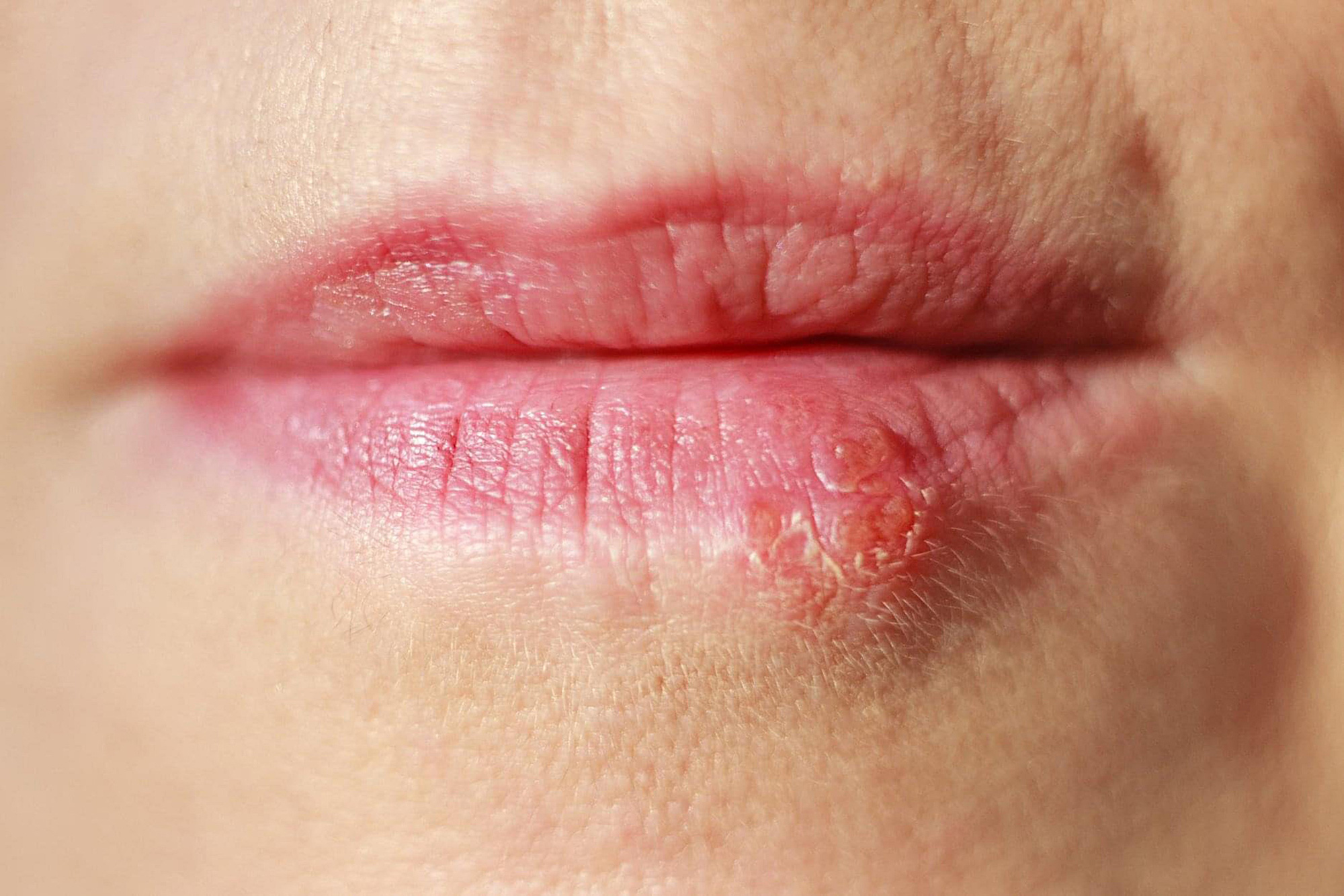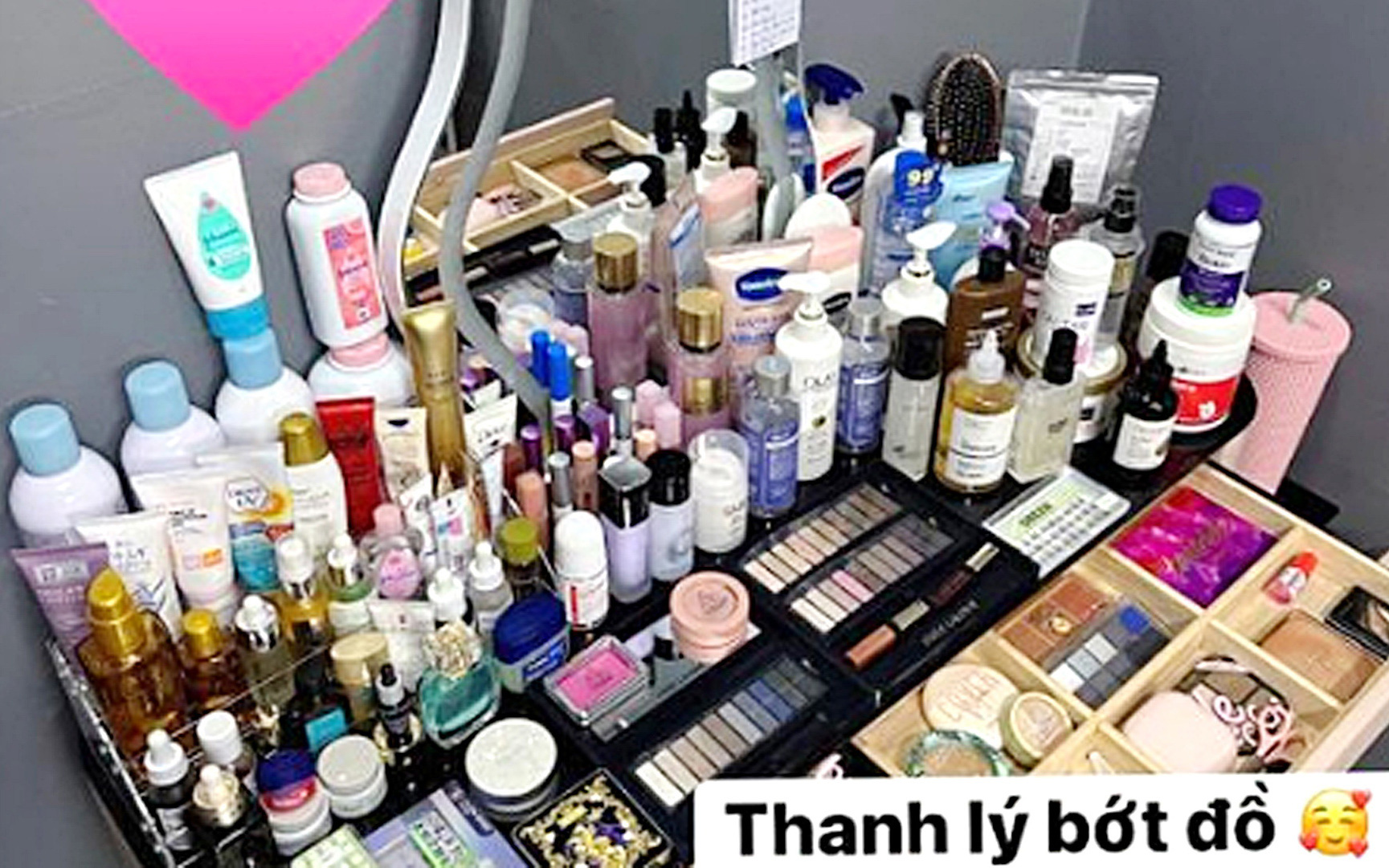
Many women suffer skin damage and viral infections due to using cosmetics of unknown origin - Photo: BSCC
Used cosmetics are often sold for reasons such as buying the wrong product or not being suitable for the user. The price varies depending on the condition of the product. Dermatologists warn of the potential risks and harm to the skin when using these products.
Skin peeling and bacterial infections from using secondhand cosmetics.
After placing orders and using used cosmetics advertised on social media, many women have had to seek help at hospitals due to various skin complications.
Dr. Phan Ngoc Huy, from the dermatology and cosmetic department of the Ho Chi Minh City Dermatology Hospital, said that the hospital receives many cases of unwanted complications after using used cosmetics sold on social media.
Common complications experienced by patients after using clearance cosmetics include allergic contact dermatitis, manifested by scaling, redness, and itching. In severe cases, the skin may become inflamed and oozing, easily leading to infection and unsightly scarring. Additionally, post-allergic skin discoloration is also quite common and requires treatment for an average of 3-6 months for complete recovery.
PTV (21 years old, residing in Quang Ninh ) sought help from a doctor with red, peeling, and painful skin. V. shared that she recently "hunted" for a set of skincare products from a famous brand, 99% new, at only 1/5 of the normal price, in a secondhand cosmetics liquidation group.
Hoping for brighter, whiter skin, V. experienced redness and stinging after just one day of use. She contacted the seller, who explained that the products were working and that the symptoms would subside after a few more days. After about three days, V. noticed her skin becoming increasingly red and irritated, with a burning sensation in the areas where the cosmetics were applied, and painful blisters appeared on her lips. Only then did V. seek medical attention.
Dr. Nguyen Tien Thanh, a member of the Vietnam Dermatology Association, who treated V., said that this was a case of irritant contact dermatitis and herpes simplex labialis caused by using products of questionable origin. V. had to be treated simultaneously for both irritant contact dermatitis and herpes simplex labialis with topical skin care, light therapy, and antiviral medication.

Used pharmaceuticals and cosmetics are being sold on social media - Photo: XM (taken from XM)
Many risks for buyers.
Dr. Phan Ngoc Huy believes that the use of discounted cosmeceuticals is increasingly popular in the beauty market, especially as consumers tighten their spending during the current difficult economic times. While this method can help buyers save a considerable amount of money and sellers get rid of unsuitable cosmetics, the risks largely lie with the buyer.
There are three potential risks you should carefully consider before using discounted beauty products sold on social media.
Firstly, cosmetics are contaminated with bacteria, viruses, fungi, and parasites. Cosmetics used directly on the skin of the previous owner, such as lipstick, mascara, eyeliner, and makeup sponges, pose a significant risk of infection. This is especially true if the person had conditions such as fungal skin infections, demodex dermatitis, or bacterial infections like Pseudomonas aeruginosa and Staphylococcus aureus. Studies show that the rate of bacterial contamination in used cosmetics is as high as 79-90%.
Secondly, the product loses its effectiveness. Cosmetics used for skincare need to be stored properly depending on the active ingredients, taking into account factors such as light, temperature, and humidity.
Typically, vitamin A derivatives such as retinol, tretinoin, or vitamin C are easily inactivated when exposed to direct light or high temperatures. Often, buyers are unable to know the true condition of the cosmetic product.
Thirdly, avoid buying counterfeit products. If you cannot verify the origin of the product, you should seriously reconsider buying it because counterfeit and low-quality products are quite common on the market. Using fake cosmetics can seriously affect your skin health, as no one knows the ingredients and their concentrations.
Additionally, another minor risk you might face is pricing. Product pricing is entirely up to the seller and negotiation between the two parties. However, it's impossible to accurately measure the exact amount of product remaining in the bottle. Therefore, you're not guaranteed to get a great deal on the black market for cosmetics.
Dr. Nguyen Tien Thanh further explained that the skin surface can harbor viruses, bacteria, and fungi that cause many skin diseases, or they may be in a latent form (not yet causing disease). Therefore, sharing cosmetic products, makeup tools, or secondhand cosmetic products carries a high risk of infection with viruses, bacteria, and fungi affecting the skin.
Furthermore, makeup tools like brushes and sponges are breeding grounds for chemicals, viruses, fungi, and bacteria that can cause infections. Lipstick is no exception. The lips are a semi-mucous area that is very vulnerable and at high risk of infection, including herpes viruses and bacteria. It's best for women not to share cosmetics or makeup tools and to avoid using secondhand products of unknown origin.
Choose cosmetics that suit your skin type and have a clear origin.
Dr. Phan Ngoc Huy advises choosing cosmetics with clear origins, complete invoices and labels, and purchasing them from reputable distributors. This is a prerequisite before evaluating the effectiveness of cosmetics.
Before using a new cosmetic product, apply a small amount to a small area of skin on the inside of your arm to check for allergic reactions such as redness, itching, or peeling after 24 hours. Avoid using too many different cosmetic products at the same time, especially when starting a new product. Consult a dermatologist for complete information before using any active ingredient or brand of cosmetic.
"Using cosmetics that suit your individual skin type is the most important thing. Choosing 'high-end' brands is only one factor. Other equally important factors include active ingredients suitable for your skin, readily available cosmetics, and the ability to use them long-term without worrying too much about the cost," advises Dr. Huy.
Source

















































































































Comment (0)